News for 03 June 2021
All the news for Thursday 3 June 2021
Belgium men and Netherlands women hold strong at top of FIH World Rankings
There has been little movement in the FIH World Rankings, with the Red Lions of Belgium and Netherlands Oranje holding onto top spot in their respective tables.
And, as we approach a busy few months of hockey competition, including continental championships and, of course, the rescheduled Olympic Games Tokyo 2020, the FIH World Rankings can provide a snap-shot of how the nations are performing.
Despite the recent match cancellations, due to Covid-19 restrictions, there have still been some scintillating matches played in the FIH Hockey Pro League, not least the 5-3 thriller between the national men’s teams of Great Britain and Germany; the fiercely contested 2-3 match in Buenos Aires again featuring Germany men as they defeated Argentina; and three consecutive draws in the test matches between Oceania rivals Australia and New Zealand (Women).
The most recent FIH Hockey Pro League matches saw both the men’s and women’s teams of Netherlands and Belgium go head-to-head in a one-off match billed ‘Winner’s Day’. It was here that Netherlands women and Belgium men were crowned FIH Hockey Pro League champions for this season. It was a double triumph as both sides also retain their places at the top of the FIH World Rankings.
Alyson Annan’s side signed off in style with a 3-0 win but Max Caldas managed to spoil Shane McLeod’s final FIH Pro league match of Season Two as he masterminded a 4-0 win.
In the women’s FIH World Rankings, Netherlands (2772.084 points) have extended their lead at the top of the world rankings to 537 ranking points ahead of second placed Argentina (2235.598). Australia (2117.490) climbed to third position after their recent test matches against New Zealand at the Trans-Tasman series. Germany (2115.185) slipped to fourth position, while England (2111.857) are ranked fifth.
The top 10 is completed by New Zealand in sixth position (1916.268), Spain in seventh position on 1902.126, Ireland (eighth place - 1683.086), India (ninth place – 1643.00) and China (tenth place – 1621.00).
Just outside the top ten, the Belgium Red Panthers (1579) are piling pressure on Korea (1580) as they move to within one ranking point of the Asia team.
In the men’s FIH World Rankings, reigning world and European champions Belgium (2533.830 points) sit at the summit in front of 2019 FIH Hockey Pro League winners Australia (second place - 2496.978), Netherlands are in third place on 2301.044, ahead of India who are just 78 points below on 2223.458.
Germany (2112.568) have jumped to fifth, courtesy of recent performances in the FIH Pro League, and England/Great Britain have also moved up a spot to sixth on 1976.092. Both sides have leapfrogged the reigning Olympic champions Argentina (1923.420).
In eighth place are New Zealand on 1672.689, with Spain in ninth position on 1636.865 and Canada in tenth on 1509.191.
How the FIH World Rankings work:
The rankings calculations model that FIH introduced on 1st January 2020 moved away from the previous tournament-based rankings system to a dynamic, match-based method where opposing teams exchange points in official, FIH sanctioned games. The number of points exchanged depends on the result of the match, the relative ranking of the teams and the importance of the match.
FIH World Rankings explained
• Based on the Elo rating system, which is used as the basis of many other sports ranking systems
• When two nations play against each other, a number of ranking points are exchanged between them
• In every match, the number of points gained by one team is exactly matched by the number of points lost by the other
• Teams will win more points for beating teams ranked above them, and therefore teams will lose more points for losing to a team ranked below them
• Teams will win less points for beating teams ranked below them, and therefore teams will lose less points for losing to a team ranked above them
• If a draw occurs, the lower ranked team will gain a small number of points and the higher ranked team will lose the same number of points
• The number of points exchanged is dependent on the result of the match (win, lose, shootout win/loss or draw), the importance of the match (part of a major tournament, or a test series for example), and the relative difference in ranking points between the teams before the match
More details about the formula used in the algorithm, weightings of matches and other factors can be found HERE together with a Frequently Asked Questions document HERE.
See the current World Rankings HERE
FIH site
25 years of Fieldhockey.com
Today marks the 25th anniversary of the start of Fieldhockey.com on 3 June 1996!
Started after a discussion in the pub after a game lamenting about how very little news there was on Hockey in traditional media and Teletext (a text news service on TV). At the time I was starting out as a website designer and thought a neutral subject like Hockey would be an ideal showcase for my skills. The content very quickly overtook the showcase aspect. Knowing a site had to change frequently to attract visitors, I decided to attempt to put at least one story about Hockey from anywhere in the world on the site to prove that Hockey was a vibrant sport. Initially this was a difficult task, but I remember one person commiserating with me in a Hockey news chat room assuring me that it would get better in time. Thank you to that kind person for your encouragement, it kept be going until the Atlanta Olympics where there was a plethora of news to sustain me.
Immediately after the Games when all the hockey journalists were on a plane back to their home countries Fieldhockey.com was unable to carry a single news story on 13 August 1996. This was the last day I was unable to find a single story about hockey on the Internet! Since then I have been able to find at least one story every single day (I remember only finding one story on an early Christmas Day about a town in India laying an artificial surface and remarking although it was only one story, it was at least a story. I got a reply from a fan in Canada about the town being his home town and thanking me for putting it on the site). During the height of COVID-19 this has been a challenge every single day with no hockey being played world wide, but my thanks goes to all the journalists who have dug out stories about the rich history of our sport and interviews with leading players to keep interest going in hockey. I think I got to only two stories at one stage, but still the goal of one story per day has been met.
Trying to live a normal life and update the site has not always been easy as International travel, family holidays and the vagaries of South African electricity supply have had to come into the equation. Finding Internet cafes and surfing up at Dubai International airport has not always been easy. Even once cellular WiFi started to make life easier there have been times where even this let me down on a trip to a remote part of South Africa where I was not able to connect to the Internet for 3 days and once where an electricity substation in our area went down for 4 days. Fortunately I was able to recover those lost days from the archives of the sites I regularly look at for stories to maintain the record of been able to find one story per day.
Running the site has allowed me to attend an enormous amount of live International Hockey at tournaments from Junior and Senior World Cups and their associated qualifier tournaments, Hockey World League, Champions Trophy, Champions Challenge, Olympic qualifiers, Continental Championships, multi-nation events and test series between two nations. In 2000 I tried to tally the number I had watched and gave up when I reached 1000 Internationals. I haven't slowed down on watching International Hockey, so I guess I must be approaching 5 - 600 Internationals by now (including all those games watched on TV and via live streaming and the now fantastic service of Watch Hockey and it's associated apps).
In watching these Internationals I have met and chatted to many of the World's top players, coaches, umpires and officials and have met many Olympic Gold medallists and actually held some of those Gold Medals. What an honour that has been. I watched one of Australian Brent Livermore's first senior Internationals and his 300th. I have watched Dhanraj Pillay and Mukesh Kumar destroy the opposition with their speed and skill and witnessed the amazing skill of Shahbaz Ahmed on the field. I have become good friends with the Panther family, whose boys represent South Africa and whose youngest Clint Panther is to my mind one of the best defensive mid-fielders in the world today - sadly denied the chance to showcase his skills more often on the World stage because of the remoteness of South Africa to World Hockey. I have seen incredible umpires like John and Peter Wright umpire the same game (John's final International), Marelize de Klerk, Murray Grime, Coen van Bunge, Laurine Delforge, Sarah Wilson, Santi Deo (the only umpire I have seen show a second green card, hold up two fingers and change it to yellow - no question as to why the player was getting a yellow for a minor infringement) with John, Marelize, Murray and Santi being 4 of only 5 having reached the incredible milestone of 200 Internationals and Coen, Peter, Laurine and Sarah achieving their Golden Whistle 100 Internationals. I have met coaches like Ric Charlesworth, Barry Dancer who coached Australia's men to their only Olympic Gold medal despite the team having been in almost all Olympic semi-finals since their entry to the Olympics in 1956 - missing out completely in RIo, Mauritz Hendricks who is the only coach to have coached a team to Champions Challenge, Champions trophy, Olympic and World Cup Golds (the others don't have that Champions Challenge Gold), Cedric D'Souza who quit in the middle of a World Cup campaign due to administrative interference, all the top Malaysian coaches who with a combination of Head Coach, Assistant coach, and Team Manager get all their top coaches in to an International event and the late Horst Wein who stayed over at my house and taught my young son the Indian dribble on our back lawn.
So what has changed over 25 years?
The Rules for one. The year before the site started the off-side rule was abolished which gives you an idea of just how much the game has changed. Only the 2016 Olympics followed by the 2018 World cup have been played under the same set of Rules otherwise no two consecutive Olympics followed by World Cup followed again by Olympics have been played under same set of Rules since the site started.
Covid regulations barring spectators aside there has been a steady decline in the number of spectators at International events to the point where the last Junior World Cup held in India was played in an almost empty Dhyan Chand stadium and even at the last couple of World Cups in games where the home nations of Netherlands or India were not involved, the stadia were depressingly empty. Could this be because of the constant changing of the Rules so spectators don't really understand the game anymore? The players I umpire certainly are confused at the beginning of each season as well as some of my colleagues. I remember at the 2001 World Cup Qualifier in Edinburgh the FIH changed the Rules on taking a Penalty Stroke so a player was not allowed to drag the shot and only announced it in the Team briefing and not to the spectators. This led a what looked like a perfectly good Penalty Stroke goal being disallowed which confused the teams, spectators and coaches until a coach had a look his video replay to show a "rooster tail" of water behind the striker's stick proving the shot had been dragged. Only those around that coach and the umpire had any idea why it had been disallowed and there were plenty of disgruntled spectators. Do that often enough and people will stop going to matches. I enjoy watching sport and can follow a game of Cricket, Rugby or Football quite easily because the Rules haven't changed that much, not to the extent Hockey has changed. I wonder if ever we will get to the point where two or more consecutive Olympics or World Cups are played under the same set of Rules. Will the Rule makers resist the urge to tinker for a whole 4 years?
Perhaps the decline in spectators is due the absurd system of quarter-finals that has been introduced making the pool games almost irrelevant and meaning a team that wins just 3 games in a tournament will win the Gold and a team that wins 5 games may only come 5th because the lost that quarter-final. This system is the sole reason why Pakistan was out of the 214 World Cup. Having finished at the top of their Pool in the Pool Games of WHL R3 they lost their quarter-final to Korea who had finished bottom of the other pool only drawing one game against Japan, and that QF being their only win of the tournament and then Pakistan lost the next play off meaning a distant 7th was the best they could do and were out of the World Cup for the first time in their history. They had a better record (Won 2 Draw 2 Lost 2) at that tournament than Korea (Won 1 Draw 1 Lost 4) who got through their quarter-final and finished 4th. Another inconsistency was The 2011 Women's Champions Challenge in Ireland where South Africa needing to come first or second in order to qualify automatically for the Olympics won every match except the quarter-final ending in 5th with a record of Won 5 Draw 0 Lost 1 and seemingly out of the Olympics (they later qualified through the last Olympic Qualifiers ever held by winning that tournament). The eventual winners, Japan's record was Won 4 Draw 1 Lost 1 (to South Africa) while Silver medallists USA Won 2 Draw 1 and Lost 3. Where is the sense in this kind of system? Governments and Sponsors don't pay for 5th place no matter how many games you actually won. We have seen how devastating this system has been to Pakistan Hockey and their rapid decline since that failure to make the World Cup. How many other nations are going to go to the wall before it is scrapped?
Recent announcements about the future of Hockey leave me dumbfounded. The Pro League has been a huge financial burden on both the FIH and the participating nations. I have been led to believe that only the winning nations managed to break even thanks largely to the prize money involved - I may be wrong. To give you an idea of how much it cost at the start South Africa calculated it would cost them R20m (at the time around £2m GBP) for their Men's and Women's teams to participate and that included a full commitment for 4 years. I pointed out to the CEO of the SA Hockey Association that they had probably forgotten about the associated costs of TV production for the home matches. The CEO admitted that they had and this would considerably push up the cost of participation. The FIH now want to introduce a Nations Cup with the winners being promoted to the Pro League. The participating nations would not thank you for that opportunity and some would probably do their utmost to lose the competition to avoid that.
Scrapping the Champions Trophy in favour of the Pro League played on a home and away basis to me has been a recipe for disaster. The idea is fine when you see full stadia for home tests, but in financial terms how does any nation going to afford to send their teams on 5-6 away tours For just 1 team. Most of the top nations have both their Men's and Women's teams involved in in the League and are looking at funding 10 to 12 away tours. Where the money is coming from is anyone's guess? Even the most affluent of hockey nations are struggling to find the money. Ireland and South Africa are struggling to find enough money to go to the Olympic Games which is one of the cheapest tournaments around as food and accommodation is taken care of by the IOC and host nation. And then you have to move to the question of players. Most International players also have a day job to attend to which becomes difficult to do in key years like Olympic years. Would you pay to watch weakened international teams because not all their players can get 6 months off work to take part for the entire tournament? This last year has seen COVID-19 wreck the tournament completely yet still the FIH want to persist with it.
The World Ranking system has come into being in the past 25 years and while it is an improvement on the nothingness that prevailed before, it is badly flawed. The original system was biased towards top nations with only Europe and Asia getting full points for their continental championship and Oceania getting more points despite only having 2 -3 teams involved in their championships as opposed to Pan-America and Africa having more participants. This has now been replaced with a marginally better system where all official Test matches score points, but Nations can lose points for losing a match. South Africa has for a long time been the destination of choice for many top nations wanting summer heat training mainly because of an extremely favourable exchange rate. The home nation can no longer afford to play tests against these visiting nations as they will lose ranking points and slip down the rankings which in turn will severely curtail Government funding and even threaten their participation in the Olympic Games because of this deteriorating ranking. Sponsors don't pay for deteriorating rankings.
There have been a number of fabulous things that have happened in the past 25 years though. We have seen the start of EHL and HIL (though the latter has now been axed in favour of the financial millstone of the Pro League) which has been fantastic for Hockey but it has taken until this year to include Women in the EHL and there is no other tournament especially for Women to participate in exist. The growth of the Azlan Shah Cup to being an annual feature on the calendar (sadly put on hold for 2 years because of COVID-19) but where is the Women's equivalent tournament? Surely one could be devised or is all the available money being devoured by the Pro League?
Growth of Hockey at grass roots level has been incredible, but almost wherever I go, this growth has been stimulated by a passion for the game by former players and not so much by the National Associations. I think particularly here of the One Thousand Hockey Legs project in India begun by one passionate individual, Mr. K Arumugam, whose enthusiasm has not only sparked the "Hockey Legs", but has caught like wild fire with people willing to give back to Hockey. I personally think that all Nations should look to this model to grow hockey within their countries, because if one man can do what Arumugam has done, what could whole nations achieve?
The biggest problem generally within these grass roots players is they are concerned about their club performance more than their regional team or National Team. They are hardly aware of Hockey outside of their own country which is a pity because this is a wonderful global sport. How do you bring up the level of interest in Global Hockey to the point of Football, Rugby or Cricket where even the players in the lowliest of club teams can discourse about the merits of the players of other Nations or the merits of their National teams? I don't think the Pro League is doing the job as the coverage is mainly restricted to subscription TV outlets that demand high fees for access to their services and apart from Hockey offers little else to the avid hockey fan making them reluctant to take out a subscription. Watch.Hockey has started to overcome this, but with Geo-Blocking this now prevents fans from watching their own nations without that expensive subscription TV service.
Thank you to all the journalists who write about this sport and make this site possible. I have met some wonderful characters and have warm memories of time spent freezing together in the stands covering Hockey. The late Bruce Hamilton belting out Advance Australia Fair; Pat Rowley's pipe and phenomenal memory of records; Mr T quietly telling his editor a 500 word limit to his article was not acceptable or sending me copy saying his editor had cut his story and please would I publish the full version (I occasionally missed a Mr. T story and have duly been told off for doing so); Bill and Jean Colwill who quietly worked together; Sydney Friskin dictating his piece over the phone and asking me to go and tell Shahbaz he would like an interview, as if not obliging Sydney was ever an option; waiting for Jon Cook to finish working his magic of getting Hockey onto the inside back pages; Dil Bahra's devotion to Sikhs in Hockey and his Hockey stamp collection; bad internet connections and fixing them - especially at World Cup '98 where a frustrated Indian journalist stood up and shouted at his computer "You are f***ing with my happiness". Jugjet Singh for the New Straits Times in Malaysia for his love and devotion to all thing Malaysian Hockey and Rod Gilmour for taking the huge leap of faith to start The Hockey Paper. Sadly some of those journalists are no longer with us, but I do cherish their memories and the work they have done to popularise our sport. We have recently lost Mr. BG Joshi of India to Covid. His dedication to the stats of Hockey was unbelievable and whenever India played I got his Stats Speak article to highlight the achievements of both nations. He will be sorely missed. Thank you ladies and gentlemen of the Press for making this all possible.
Throughout this piece I have used the first person and it may come as a surprise to many that Fieldhockey.com is run by one person. It has taken a lot of my time and I must thank my wife, Helen and family for putting up with my obsession with Hockey and giving me time to do my "work".
Finally, I must thank the companies that have sponsored Fieldhockey.com over the years. Just Hockey Australia, Mazon, and Sportplan are currently keeping the site going. Dita USA and Barrington Sports were major sponsors in the past. I would not be able to afford to do this without you and thank you from the bottom of my heart.
European Hockey Championships 2021: Men’s preview, teams guide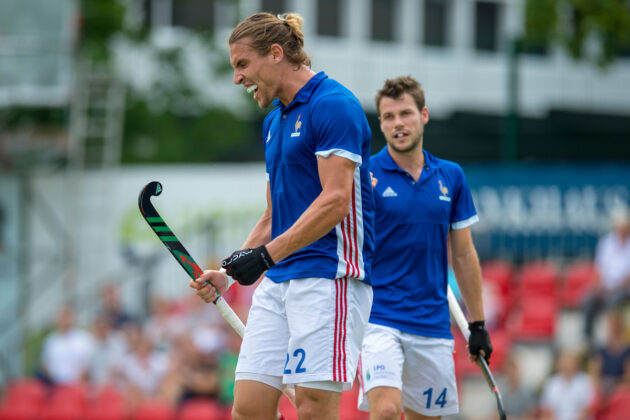
France will be hoping to qualify for successive World Cups
The 2021 European Championships begin on Friday 4 June. Here is a look at the participating Men's teams.
Pool A
Belgium
World ranking: 1st
EuroHockey Championship appearances: 17
Best finish: Winners (2019)
Shane McLeod’s reigning champions have been able to call on an incredibly consistent line-up in recent times and there will be 17 of the 18 players that won in Antwerp two years ago returning this time.
The one changes sees Manu Stockbroekx come into the panel with Sebastien Dockier the player to miss out. Otherwise, it is pretty much the same side that won the World Cup in 2018 with stellar names like FIH Player of the Year Arthur van Doren, John-John Dohmen, Thomas Briels, Felix Denayer, Vincent Vanasch and Tom Boon aiming to add to their medal haul.
Even their young players are massively experienced with Victor Wegnez closing in on 100 caps while Antoine Kina has over 70 to his name.
“We go to Amsterdam to defend the title we won two years ago but, above all, we will be happy to play a series of matches there and assess our level with even greater precision,” McLeod said ahead of the event. They won the FIH Pro League this week but a 4-0 defeat to the Netherlands on Sunday means there are still areas to work on.
England
World ranking: 6th
EuroHockey Championship appearances: 18
Best finish: Winners (2009)
Head coach Danny Kerry has named an experienced squad for the Europeans. This includes 2009 gold medallist Adam Dixon who captains the side, while David Ames could make his 50th appearance for England if he features in every game.
The likes of Harry Martin, Chris Griffiths, Ian Sloan and Phil Roper all have a wealth of international know-how while exemplary striker Sam Ward gives their attack a really snappy fulcrum.
Conversely, this will be 22-year-old Ollie Payne‘s first experience of a senior tournament and – along with Zach Wallace – he is one of two players under 24. David Goodfield will pull on an England shirt for the first time since 2018, having returned to international hockey with Great Britain in October.
England will be aiming to return to the top four following a low-key tournament in 2019, finishing outside the semi-final spots for the first time since 2007.
Russia
World ranking: 22nd
EuroHockey Championship appearances: 5
Best finish: 7th (2011)
Following promotion in 2019 from the second division in Cambrai, they are now hoping to retain their place in the top tier for the first time since relegation was introduced to the European Championships. Promotion in 2009 and 2015 has been followed both times but a drop straight back down once again.
It has also been a difficult preparation for them as they have not played a capped senior international match since their unsuccessful Olympic qualifier back in 2019 putting team leader Alexey Sorokin and head coach Vladimir Konkin at a major disadvantage.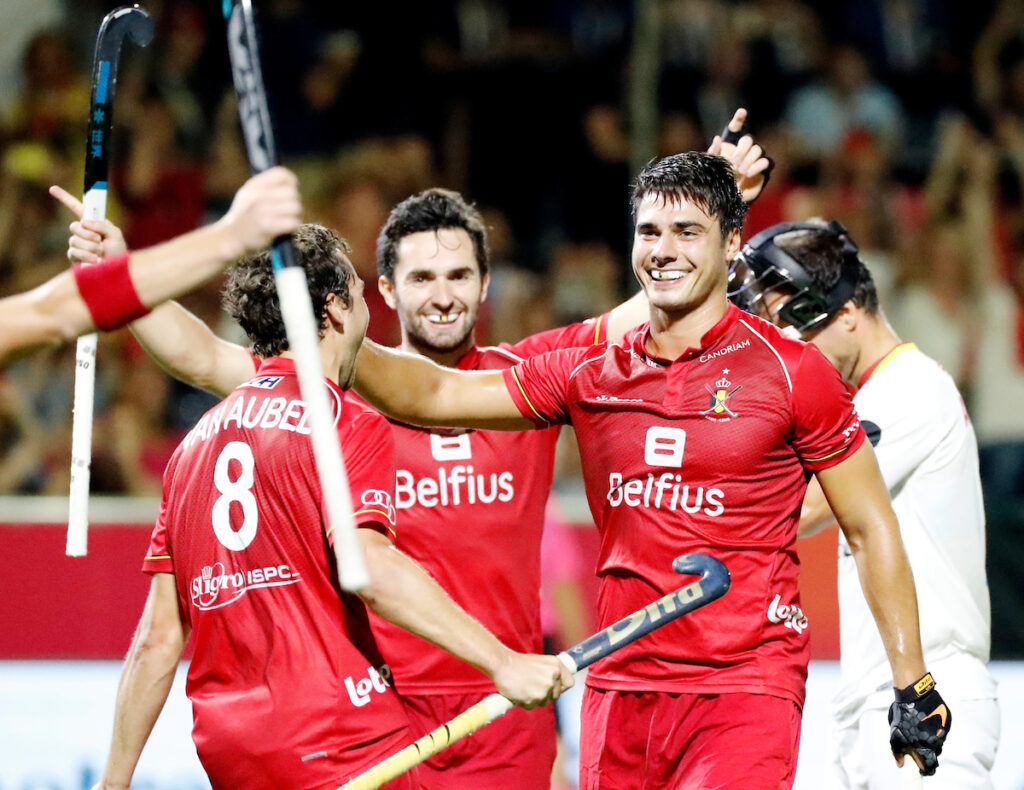
Konkin took on the job in 2018 but has overseen just 18 games in that time, winning 10 of them but none against top ten opposition which makes this a very tricky proposition ahead.
Of the wider panel named, the wily Pavel Golubev and defensive giant Nikolay Yankun have been mainstays of the side while youngster Georgii Arusiia has impressed in the Euro Hockey League for Dinamo Elektrostal.
Spain
World ranking: 9th
EuroHockey Championship appearances: 18
Best finish: Winners – 2 times (1974, 2005)
One of European top hockey’s ever-present teams, Spain will be pushing to land a third title this week following an exceptional run two years ago in Antwerp.
It will be the last European championship for some of Spain’s all-time legends like goalkeeper Quico Cortes – who played in the 2005 gold medal success – Pau Quemada, David Alegre and Josep Romeu indicating they will retire after this summer.
Indeed, with Miki Delas and Marc Salles, it is a panel loaded with knowledge with 14 players from the 2019 silver winning side lining out again.
Roc Oliva was originally named in the panel but due to the impending arrival of his new baby, he has stepped out with Marc Miralles stepping in.
The team is coached by Fred Soyez who will be on the move back to his homeland, France, in the wake of this summer’s activities while current Dutch coach Max Caldas has been confirmed as the man to take over later this year.
Pool B
France
World ranking: 12th
EuroHockey Championship appearances: 15
Best finish: 4th (1970)
France earned promotion back to the top tier with a storming run to the second division trophy in 2019 on home turf in Cambrai with skipper Victor Charlet scoring seven times in five games.
It followed on from their successful 2018 run to the World Cup quarter-finals with Jeroen Delmee’s team one very much on the rise. They have a strong core of players who operate at the upper end of the Belgian league like Nicolas Dumont, Gaspard Baumgarten and Jean-Baptiste Forgues.
And they will take plenty of confidence from a 5-2 win over Germany in a challenge match on May 28th with goalkeeper Arthur Thieffry excelling and livewire striker Pieter van Straaten in the mix.
It will be Delmee’s last tournament before he goes on to coach the Netherlands and the initial target will be to retain a place in the top tier for the first time since 2009 having endure relegation in 2011 and 2015.
Germany
World ranking: 5th
EuroHockey Championship appearances: 18
Best finish: Winners – 8 times (1970, 1978, 1991, 1995, 1999, 2003, 2011, 2013)
Germany will be looking to end a relative medal drought in the Euros following fourth place finished in 2017 and 2019 with the last of their eight Euro golds coming in 2013.
Coach Kais al Saadi announced his side in tandem with his Olympic squad announcement, confirming Mats Grambusch will not play in the Euros but a spot is still open for him for the Olympics If he can be fit in time.
The side includes double gold medalist Tobias Hauke (2008 and 2012) and Florian Fuchs and Martin Häner who won the Olympics in 2012). There are nine players from the 2016 bronze medal winning side in their European line-up with exciting newcomers like Justus Weigand, Linus Müller and Paul-Philipp Kaufmann hoping to make their mark.
The other fresh face is 21-year-old TSV Mannheim man Alexander Stadler who has managed to show enough to get in ahead of Mark Appel and Victor Aly in the goalkeeping rankings
Netherlands
World ranking: 3rd
EuroHockey Championship appearances: 18
Best finish: Winners – 5 times (1983, 1987, 2007, 2015, 2017)
Five-time winners, the Netherlands have only finished outside the medal positions on one occasion in 17 previous attempts, running up seven silver medals and four bronze in total. As such, it makes them one of the sides to watch and they bring an exciting line-up to their home party.
Goal machine Jeroen Hertzberger, 35, has made the squad to mark his full comeback to prominence having originally been left on the sidelines in the wake of the 2016 Olympics in Rio. He is the most experienced player in their squad with 253 caps.
He gets the nod just ahead of the likes of Roel Bovendeert, Terrance Pieters and Bjorn Kellerman in the forwards with club mate Thijs van Dam offering great pace alongside him. Their corner options are powerful from Mink van der Weerden and Jip Janssen. Seve van Ass and Billy Bakker offer creativity and Sander de Wijn is the enforcer in the defence.
Wales
World ranking: 18th
EuroHockey Championship appearances: 10
Best finish: 6th – 2 times (1974, 1999, 2019)
Wales produced a fairytale performance in 2019 to finish in sixth place in their first top tier European Championships since 1999, equaling their best ever performance on this stage. It was made all the more impressive as they were in the third tier in 2015, earning back to back promotions to get to the highest level.
The lowest ranked side going into the 2019 edition, they drew with England 2-2 and ran up a breath-taking 4-0 victory over Ireland to retain their place.
They are bolstered by Rupert Shipperley and Jacob Draper who have impressed in the past few years with the Great Britain team while Gareth Furlong has a rocket drag-flick which he has showcased in the Dutch leagues.
Players like Lewis Prosser, Luke Hawker and Owain Dolan-Gray have been crucial parts of the journey and their recent 6-1 win over Scotland in a warm-up game suggests they are up for the challenge once again.
Provided by EHF
SIGN UP for The Hockey Paper’s returning newsletter: Promotions, exclusives and our best coverage
The Hockey Paper
European Hockey Championships: Facts and stats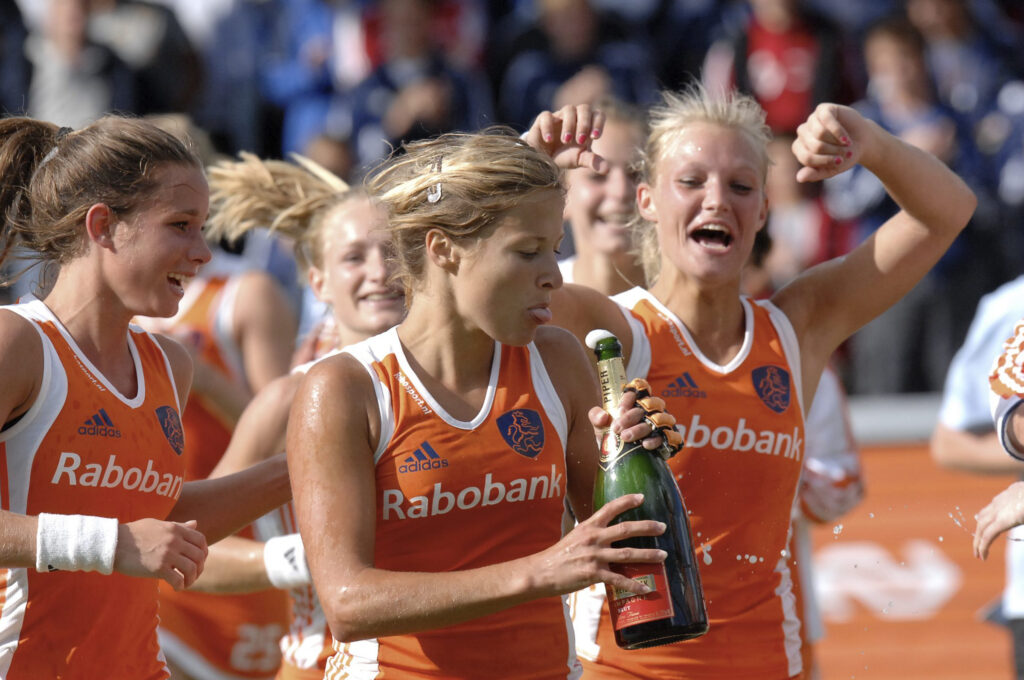
The Dutch celebrate another women's title success PICS: Worldsportpics
Back in time: Germany’s treble
Germany broke Dutch hearts in 1999 for the third time in succession thanks to an 8-7 win on penalty stokes in Padua, Italy. Four years previously, the Germans had also won on strokes. The Spanish fared little better in 2003 as, for the third time, the stout Germans also lifted the trophy on penalty strokes.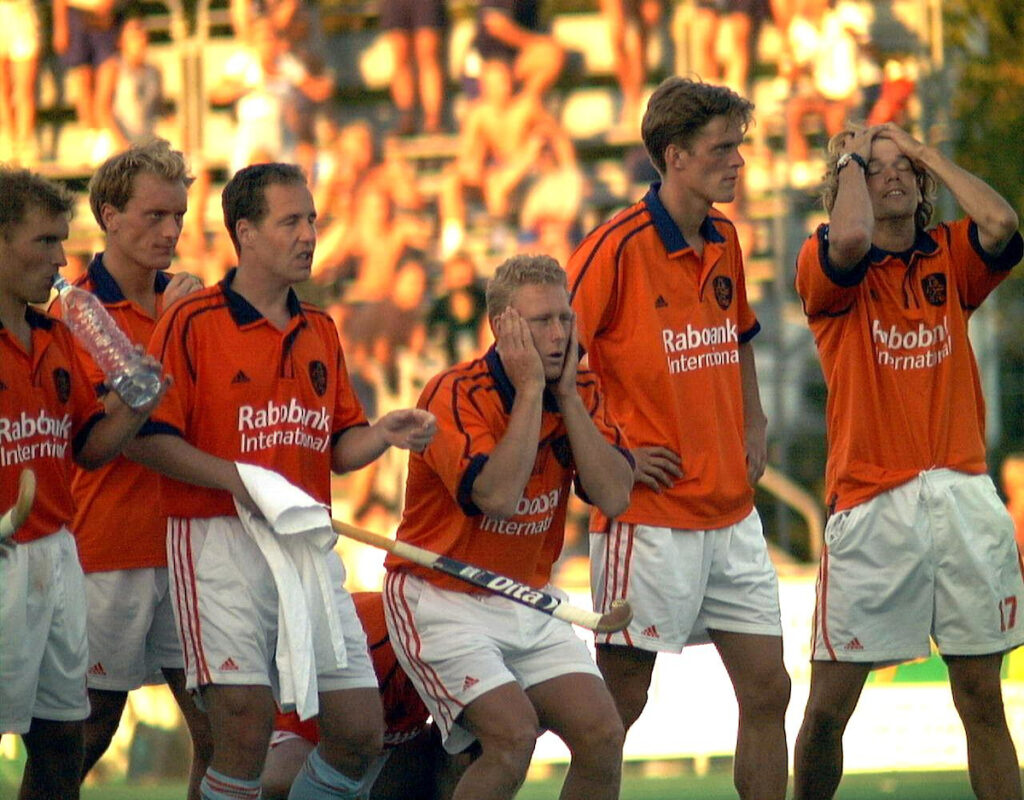
Spain’s old guard
There is no shortage of experience in Spain men’s squad:
Quico Cortés, aged 38
Pau Quemada, 37
Miquel Delas, 37
David Alegre, 36
Dutch dominance
Holland women’s 2019 title was their 10th EuroHockey success from the 14 previous editions. They’ve only twice failed to reach the finals, in 1991 and 2013. That’s when England won the title and finished runners-up respectively. The Dutch head into this Championships with coach Alyson Annan having racked up her 100th international win in March during their Pro League win over Germany. Impressively, she achieved the feat in just 120 matches.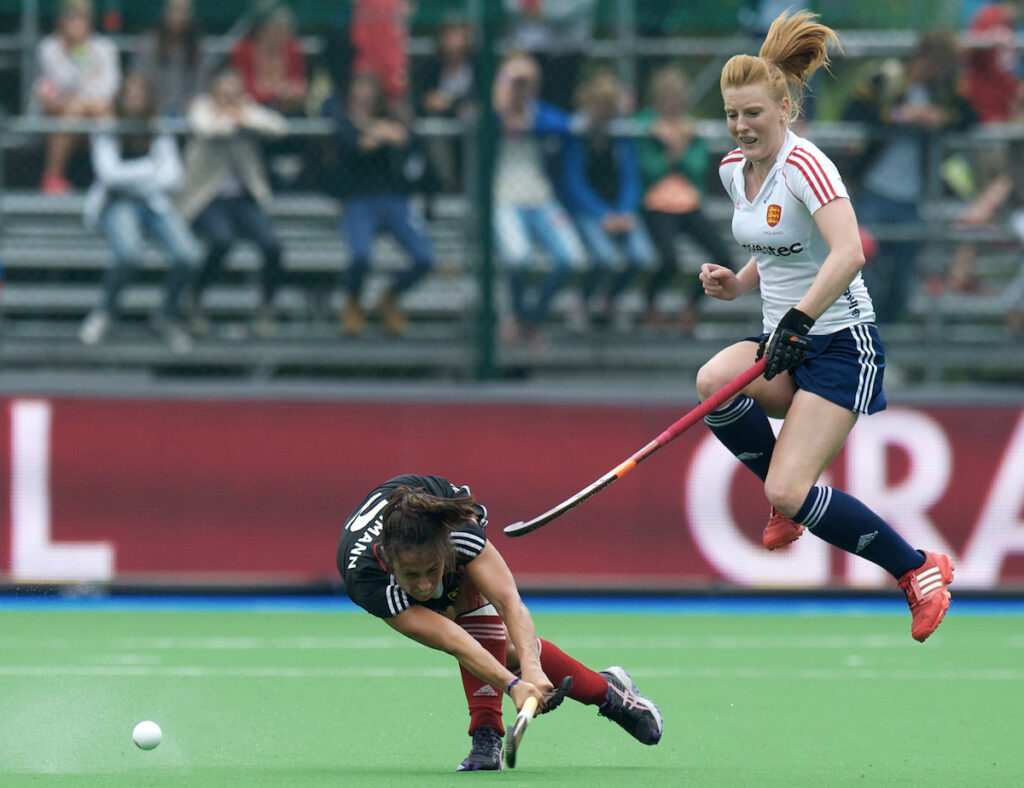
Feast of goals
The biggest win in the men’s Championship is still the 13-0 drubbing Spain handed out to Malta in 1970, while the most goals came during Belgium’s 11-4 success over Russia at EuroHockey 2015.
England aim to atone
In finishing fourth two years ago, England women failed to win a medal for the first time in 16 years after a shoot-out defeat to Spain, following a record 8-0 defeat to Holland. Further, with the men’s fifth-place finish, England recorded their worst showing in 35 years at a combined Championships.
SIGN UP for The Hockey Paper’s returning newsletter: Promotions, exclusives and our best coverage
The Hockey Paper
Tumilty aims to kickstart new era for Irish men’s team with 14 fresh faces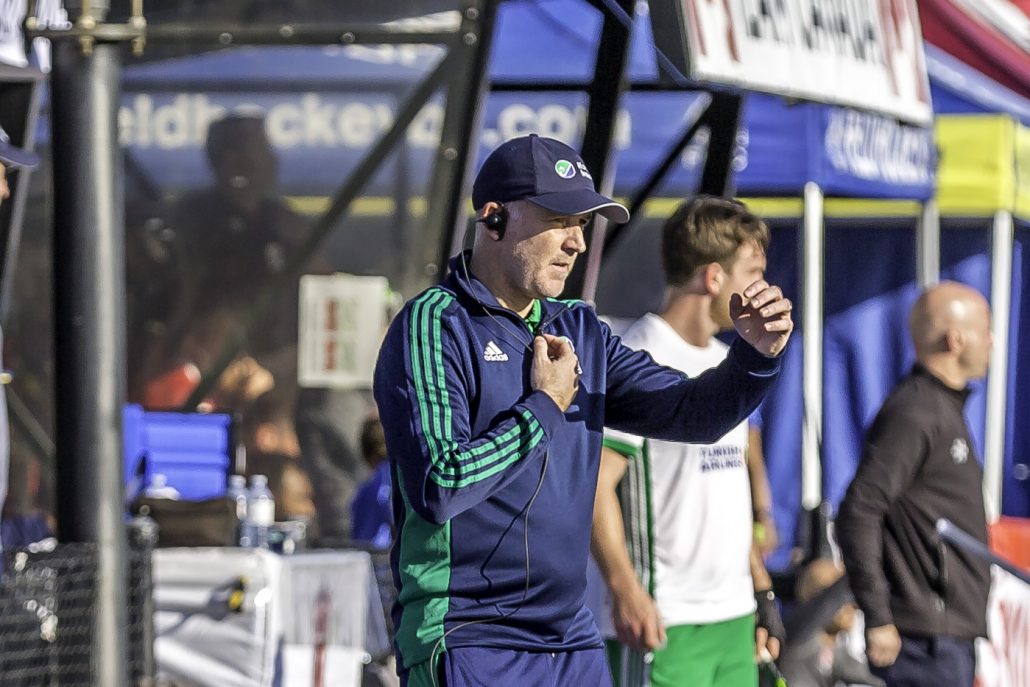
FIH Olympic Qualifier, Canada v Ireland 2019 at Rutledge Field ,West Vancouver, BC, Canada on October 26,2019. Photo: Chris Wilson
Irish men’s coach Mark Tumilty will kickstart a new era for the Green Machine next week as he looks set to hand 14 players their first taste of senior international hockey.
Ireland will face Scotland in an uncapped three-game series with games on June 10th, 12th and 13th at the recently redeveloped pitch at University of Ulster, Jordanstown.
These will be the first games for the side since October 2019’s Olympic qualifiers in Vancouver and it offers the side a chance to give new faces a chance to stake a claim for a place in Tumilty’s plans for the next cycle.
It comes ahead of a busy summer with the European Hockey Federation confirming on Monday the second tier of continental competition has been cleared to go ahead in Poland in August. There is also a potential World Cup qualifier in October on the horizon.
With this in mind, Tumilty has sought to significantly widen his playing options over the past nine months, working in regional hubs with a host of rising talent.
In defence, former Under-21 internationals Kyle Marshall, Mark Samuel and Matthew Walker and ex-Under-18 star Fergus Gibson included along with Mark McNellis. The uncapped midfielders are Lisnagarvey Jonny Lynch and YMCA’s Sam Hyland while the forward line is augmented by newcomers Troy Chambers, Simon Wolfe, Ollie Kidd, Ian Stewart, Ben Nelson and Conor Empey.
James Milliken completes the uncapped group having previously been part of the panel that went to Vancouver in 2019.
They are joined by 11 more senior players and Tumilty is excited by what the future holds.
“We have a very young group, an exciting group and one that has worked extremely hard over the last year,” he said.
“We need to be patient with these players. There will be ups and downs and challenges along the way but I definitely think there is talent to work with. I also feel it is a great opportunity for the players who have been involved for a period of time to have a much greater influence on the team”
The coach has also been pleased to formalise his coaching staff in recent weeks. Eoin Cunniffe has been installed as physical performance lead for the side while Neill Irwin will be the team manager and nutritionist. The latter will dovetail that role with his work with the all-conquering Dublin senior footballers.
“Eoin co-ordinates the support side of the staff, the physios, the S&C and so on. He has done really well in developing the players physically. I felt this was a key area in which we needed to be much better, so I look forward to seeing how the improvement made here enable us to play a more aggressive and attacking style of play.
“Neill has made good progress in educating the players of the importance of nutrition and how it can enhance their performance. The players have engaged extremely well with him.
“For Neill, he is also involved with Dublin GAA as a nutritionist which gives him a great understanding of high performance and has been involved with a very successful and professional environment.
“Neill has also taken on the important role as manager. Ross Willis was added this week as video analyst, so it is great to finally have the management team in place now as we work towards the Euro’s and hopefully WCQ.”
Ireland men’s panel for Scotland series – Jordanstown; Thursday, June 10th to Sunday, June 13th (club, caps):
Jamie Carr (KHC Leuven, 36), James Milliken (Lisnagarvey, 0), Mark Ingram (Pembroke, 26); Kyle Marshall (Beeston, 0), Mark Samuel (UCD, 0), Matthew Walker (YMCA, 0), Peter McKibbin (Lisnagarvey, 1), Fergus Gibson (Loughborough Students, 0), Sam O’Connor (Glenanne, 14), Tim Cross (Annadale, 8), Lee Cole (Monkstown, 89), Mark McNellis (Lisnagarvey, 0); Sean Murray (KHC Leuven, 78), Jonny Lynch (Lisnagarvey, 0), Neal Glassey (Crefelder HTC, 61), Daragh Walsh (Three Rock Rovers, 51), Sam Hyland (YMCA, 0), Michael Robson (Annadale, 113); Troy Chambers (Lisnagarvey, 0), Simon Wolfe (Cork C of I, 0), Ollie Kidd (Lisnagarvey, 0), Ian Stewart (Corinthian, 0), Conor Empey (UCD, 0), Ben Nelson (Lisnagarvey, 0), Ben Walker (Three Rock Rovers, 35), Jonny McKee (Crefelder HTC, 43)
Fixture schedule
Thursday, June 10th: Ireland v Scotland, 7pm, Jordanstown
Saturday, June 12th: Ireland v Scotland, 5pm, Jordanstown
Sunday, Sunday 13th: Ireland v Scotland, 11am, Jordanstown
Irish Hockey Association media release
Ireland men back in action against Scots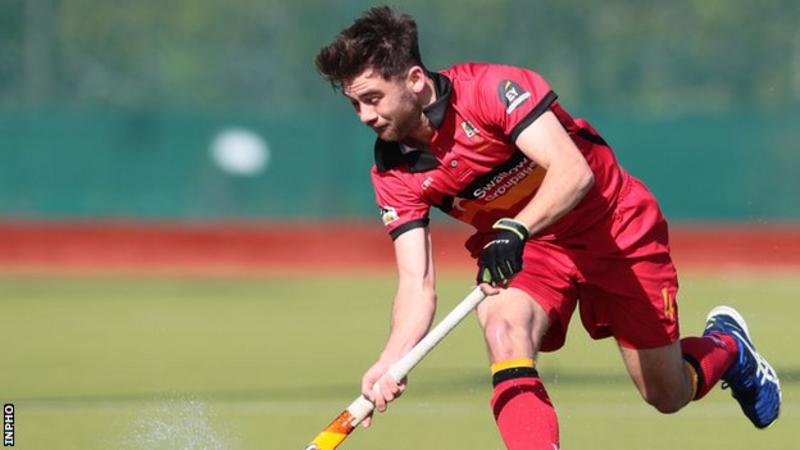
Kyle Marshall played for Ireland's Under-21 before attempting to play his way into the Great Britain squad
Ireland men's coach Mark Tumilty has included 14 uncapped players in his squad for a three-match series against Scotland at Jordanstown next week.
The games will be the Irish team's first matches since losing their controversial Olympic play-off defeat by Canada in October 2019.
Former Banbridge player Kyle Marshall is included after opting to switch back allegiance to Ireland.
Troy Chambers is among five Lisnagarvey men handed first call-ups.
Chambers' club-mates Mark McNellis, Ben Nelson, Jonny Lynch and Ollie Kidd are also in line for their first Ireland appearances as is goalkeeper James Milliken, who was part of the squad for the Olympic play-off in Vancouver but has yet to play for his country.
Marshall, who plays for English club Beeston, is joined in the squad by other fellow former Ireland Under-21 players Mark Samuel and Matthew Walker.
Eugene Magee and Chris Cargo are the only members of the squad that played in Canada 19 months ago to have retired from international duty.
However, several experienced members of Tumilty's squad are unavailable for next week's series with Covid-19 regulations in the Netherlands and Belgium ruling out a number of players including David Harte, Conor Harte and Jonny Bell.
But the squad still does include a number of regulars including Germany-based duo Neal Glassey and Jonny McKee.
Former Australian international Tim Cross, who recently signed for Annadale, is also again included after making his Ireland debut in 2019.
The games will take place on 10, 12 and 13 June and will be part of Ireland's preparations for the EuroHockey Championship Two which takes place in Poland in August, when the Irish will need to secure a top-two finish to progress to the World Cup qualifying tournament in November.
Ireland squad
Jamie Carr (KHC Leuven, 36 caps), James Milliken (Lisnagarvey, 0), Mark Ingram (Pembroke, 26); Kyle Marshall (Beeston, 0), Mark Samuel (UCD, 0), Matthew Walker (YMCA, 0), Peter McKibbin (Lisnagarvey, 1), Fergus Gibson (Loughborough Students, 0), Sam O'Connor (Glenanne, 14), Tim Cross (Annadale, 8), Lee Cole (Monkstown, 89), Mark McNellis (Lisnagarvey, 0); Sean Murray (KHC Leuven, 78), Jonny Lynch (Lisnagarvey, 0), Neal Glassey (Crefelder HTC, 61), Daragh Walsh (Three Rock Rovers, 51), Sam Hyland (YMCA, 0), Michael Robson (Annadale, 113); Troy Chambers (Lisnagarvey, 0), Simon Wolfe (Cork C of I, 0), Ollie Kidd (Lisnagarvey, 0), Ian Stewart (Corinthian, 0), Conor Empey (UCD, 0), Ben Nelson (Lisnagarvey, 0), Ben Walker (Three Rock Rovers, 35), Jonny McKee (Crefelder HTC, 43)
BBC Sport
Hockey Australia supports reconciliation
During National Reconciliation Week (NRW), Hockey Australia wishes to convey its support and acknowledgement of the continued growth of the reconciliation movement with Aboriginal and Torres Strait Islander people.
This year marks almost three decades of Australia’s formal reconciliation process, and as a national sporting organisation, Hockey Australia seeks to play its part towards reconciliation.
Australian hockey has a proud record of Indigenous players who have represented the Hockeyroos and Kookaburras. Joel Carroll, Des Abbott, Baeden Choppy, Nova Peris and current Hockeyroos Brooke Peris and Mariah Williams are some of the names who have and continue to represent their country with distinction.
Hockey Australia’s flagship Pilbara Community Hockey Program, supported by Fortescue Metals Group, sees Hockeyroos and Kookaburras players run clinics and promote the importance of education and having a healthy and active lifestyle to Indigenous kids.
The Cairns Hockey Association’s Aspire to be Deadly program is another significant program dedicated to supporting young Indigenous people.
HA launched an Indigenous Round during the 2020 FIH Pro League in Perth and looks forward to making this an annual occurrence.
As part of Indigenous Round, the Hockeyroos and Kookaburras wore a specially designed Indigenous uniform, there was a Traditional Welcome to Country Ceremony, and 12 Indigenous girls travelled to Perth from Cairns to take part in small games at half time of the international matches.
HA has also commenced the development of a Reconciliation Action Plan.
“Reconciliation encompasses many aspects. We acknowledge the first peoples of Australia walked this land well before European settlement,” said Hockey Australia CEO Matt Favier.
“As a sport, we recognise the unacceptable treatment of and racism towards Indigenous people. Firstly, we must listen and learn from Indigenous Australians, and then we can commence meaningful change.”
“This week shines the light on the importance of understanding the plight that Aboriginal and Torres Strait Islander people have faced over our history as a nation and how we need to continue to change our thoughts, attitudes and behaviours towards reconciliation for the better.”
“Most importantly, what we do and say needs to be authentic and genuine. This comes about through our actions to positively impact the relationships between the wider Australian community and Aboriginal and Torres Strait Islander peoples.”
“National Reconciliation Week has been a timely reminder of how we can embrace our national heritage and how we can take that extra step to engage in the reconciliation process.”
Hockey Australia media release
COVID-19: Hockey India's national technical official Rabbi Roshan passes away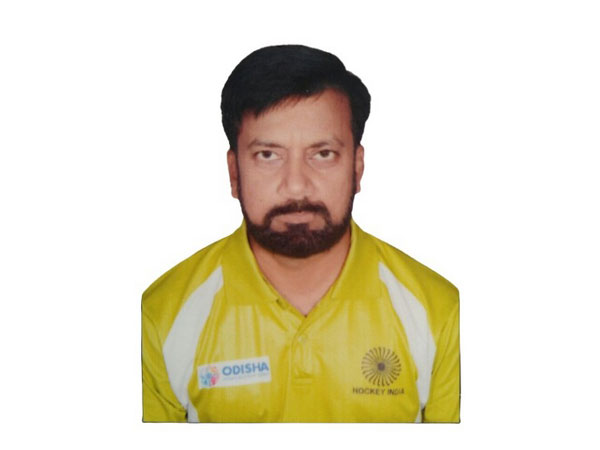
Hockey India mourned the death of 44 year old national technical official Rabbi Roshan who passed away on Thursday in Bihar due to a prolonged illness caused by COVID-19.